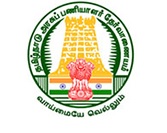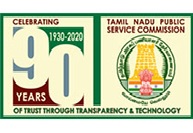TNPSC History Exam Syllabus : Tamil Nadu Public Service Commission
Organisation : Tamil Nadu Public Service Commission (TNPSC)
Exam Name : TNPSC History Examination
Standard : PG Degree Standard
Subject Code : 317
Announcement : TNPSC History Exam Syllabus
Website : https://www.tnpsc.gov.in/English/new_syllabus.html
TNPSC History Exam Syllabus
TNPSC History Exam Syllabus are given below,
Related / Similar Syllabus : TNPSC Leather Technology Exam Syllabus

UNIT – I : Indian Races And Geography
Influence of geography on Indian History – Pluri-culturalism – Unity in Diversity – Sources of Indian History – Beginning of historic period – Indus Valley Civilization – Area – features – Rig Vedic and – Later Vedic cultures – Challenges to Vedic religion and society – Rise of Jainism and Buddhism – Results.
UNIT- II: Ancient Indian Polity (Up To 7Th Century Ad)
Persian and Greek invasions – Impact – Age of ancient Indian empires – Rise of Magada and The Mauryas – Asoka – His wars – Services to Buddhism – Deal of Kingship – Mauryan administration and art – The Kushans in the north – west – Kanishka’s achievements. The Guptas – Chandra Gupta I – Samudra Gupta – Chandra Gupta II – Hindu revivalism -Popular devotion as an alternative to puritan faith – Religious Art – Rigidity of Caste system – Accounts of Fahien.- The Vardhana Kingdom – Harsh Vardhana as the last great ruler of ancient India.
UNIT- III: Ancient And Pre-Medieval Tamil Culture
Sangam Age – Archaeological sites – Adicha Nallur – Pallavaram – Arikkamedu – Keeladi – Sangam polity- The Kalabhras –The new findings on their importance – The Pallavas – Politics – society and culture – Relations with neighbours – The first Pandyan kingdom – The Greater Cholas and the Second Pandyan Kingdom – Their contribution to religion, art and literature – Spread of Tamil culture abroad.
UNIT-IV: Medieval India – Rise Of The Crescent Over The Sub-Continent
i) A result less episode-The Arab conquest of Sindh- Turkish invasions and the aftermath – Pathfinders – Mahmud of Ghazni – Muhammad of Ghore – The foundation of Delhi Sultanate- The Slave Rulers- Qutb-ud-din Aibak to Balban – The Khilji imperialism – Ala-ud-din Khilji – Tughluq Dynasty – Mohammad –bin-Tughluq – Feroz Tughluq – The Sayyids and Lodis – Delhi Sultanate – Adminstration – Society – economy – Religion and culture under them.
ii) Medieval Deccan-Cultures at conflict -Bhamini Kingdom- Muhammed Gawan- Hindus reaction to the Muslim might in Deccan- Foundation of Vijaya Nagar – Krishna Deva Raya – His achievements – Society and culture under Vijaya Nagar – Fall of Vjaya Nagar – Battle of Talikotta ( 1665)- Impact of Vijayanagar on Tamil Nadu – The Nayak rulers of Tamil Nadu – their cultural contributions – Bakti Movement- Sankara – Ramanuja – Madhwa – Kabr – Guru Nanak – Chaitanya – Ramananda – Vallabha – others.
UNIT-V : The Second Phase of Islamic India
i) The Greater Moghals – Babur- Humayun – Sur interregnum – Shershah – Akbar to Aurangzeb – Moghal policies of the North West – Rajputs- Hindus and Deccan- Shivaji the Deccan Ulcer – Religion and Society – Art and literature.
ii) Declining phase of the Moghals- Reasons – Advent of the Europeans – Trade settlements – Laying foundation of the British colonial empire in India – Anglo – French rivalry – Carnatic Wars in the Peninsula – Bengal Affairs – Battle of Plassey (1757) and after.
UNIT-VI : British Empire- Expansion & Consolidation
i) Policies of conquests – Subsidiary Alliance- Lapse Doctrine – Wars with Mysore – Marathas – Sikhs, Burma – others – British East India Company’s rule up to 1857 – Robert Clive – Warren Hastings – up to Dalhousie – Social and administrative and judicial reforms – Mahalwari- Ryotwari Permanent and other revenue settlements.
ii) Early Resistance to British Exploitation – Puli Tevan – Veera Pandia Katta Bomman In the far South – South Indian Rebellion(1800-1801) –The first organized anti – British uprising – Vellore Mutiny ( 1806)- Sepoy Mutiny ( 1857) – Results – End of the Company’s rule – Queen’s Proclamation.
iii) The Crown’s Administration – Development of modern India – From Lord Canning to Lord Mount Batten –- Local self government – Public Services – Bureaucracy- Growth of Education – Press – Transport and Communication.
UNIT-VII: Pre & Post Independent India
i) Indian National Movement- Causes for national awakening – Socio-religious reform movements of the 19th and 20th centuries with special reference to Tamil Nadu – Early national associations – Indian National Congress – Causes for its birth – The Moderates and the Extremists of the INC- Gandhian Era – Role of Tamil Nadu in the Freedom
ii) India Post Independence – The Congress Regime – Jawaharlal Nehru- Lal Bahadur Sashtri – Indira Gandhi – Emergency – Coalition Politics – Morarj Desai – V.P.Singh – I.K.Gujral – Five Year Plans – India in world affairs – Non- Alignment – Peace keeping role – Panch Sheel- Assistance to the UNO- SAARC- BRICS- Nuclear and Space research- Human rights issues in India – Bhopal Tragedy- Narmada Pachao Andolan – Keela Venmani – Reservation – Issue of OBCs.- Media and its role.

Section –B – World Through Ages
UNIT-VIII : Ancient & Medieval World
i) Ancient civilizations – Egypt – Mesopotamia – Classical cultures of Greece and Rome – Christianity – Principles and spread- Monasticism .
ii) Medieval World – Islam -Rise and escalation – Legacy – Medieval European culture – Towns ,guilds and Universities.
UNIT- IX : Modern Global Trends
i) Dawn of Modern Age – Fall of Constantinople – Impact- Renaissance- Maritime discoveries – Reformation – Counter Reformation – Rise of Nation States.
ii) People Vs. Rulers – Age of Revolutions – The Glorious Revolution – French Revolution – Russian Revolution – The Chinese Revolution – The Meiji Restoration – The American War of Independence – Unification of Italy and Germany.
iii) Science and Modernism – Industrial and Agricultural Revolutions – Course –Results.
UNIT –X : End Of Afro-Asian Colonial Empires & Global Peace
First World War – The League of Nations – Rise and fall of Japan in Asia – World War II – Emergence of People’s Republic of China( 1949)- UNO and its achievements.
Download Syllabus
TNPSC History Exam Syllabus Link:
http://www.syllabus.gen.in/uploads/pdf2022/2912-syllabus.pdf